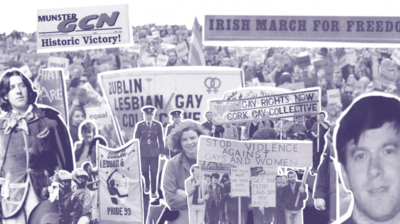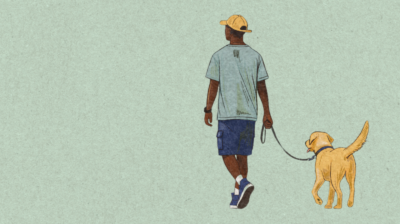Why gender stereotypes have hurt my mental health
Mike talks about the pressure of stereotypes on young men and why it can be so harmful to their mental health.

Hi, I’m Mike. I’m 22 years old and a cisgender man. Gender stereotypes exist in every part of our society and they tend to affect everyone in different ways. In my experience, they are nearly always damaging and false. The effect they can have on somebody’s mental health can be quite powerful. I’m no stranger to these stereotypes and how they can have a negative impact on one’s mental health.
Men should be encouraged to show their emotions
By far the most commonly held stereotype that I have encountered is the idea that men shouldn’t talk about their feelings. Growing up in Ireland, I’ve seen this come up in many different forms, but the most common is being told that big boys don’t cry. As a kid, I used to cry a lot and I hated it about myself. I saw it as a sign of weakness that I couldn’t stop myself from crying if I was overly nervous, scared, angry or any range of emotions I may have been feeling. By the time I was 10 or 11 I was able to push it back no matter the situation. Since then, I could probably count the number of times I’ve properly cried on my hands.
Ironically, I find myself incapable of crying, even when I want to. I spent so long pushing down this thing that I saw as weak, because at the end of the day, big boys don’t cry right? This had a real impact on my development as a person and it’s something I think we should change. When we don’t feel comfortable expressing our emotions, we bottle them up. We keep them to ourselves and internalise harmful feelings. But when we talk about how we feel and express our emotions, we can begin to realise how valid our feelings are. We as a society need to be raising our children to recognise the importance of expressing emotions. We need to stop labelling these expressions as “girly” or “childish”.
The impact on my mental health
This pressure to hide my emotions ended up being something that has more than a physical effect on me. It was around that 10 or 11 age mark that I started having suicidal thoughts. I was overly self-critical, and I had begun to think the world was better off without me. This was the beginning of years of growing self-hatred and depression. Not once during this time did it occur to me to talk to somebody about it. This was mainly due to my own lack of self-worth, but a significant portion of what stopped me was the belief that I shouldn’t have to talk about my feelings. At the time I felt that I knew what I was telling myself was true, so there was no point in talking to somebody. I was a boy and felt that boys don’t talk about their feelings.
Looking back at that time in my life, I can’t help but think what would’ve changed if I had felt comfortable talking about my feelings. It’s impossible to know for sure, but I really believe it could have completely transformed who I was and who I am, had I talked to someone about it sooner. When I did eventually tell people what I was feeling and why, it became clear straight away that I was completely wrong. I could’ve saved myself years of self-torment were I living in a society that not only accepted but encouraged people to talk about their feelings.
We are getting better, as a society, at encouraging people to talk about their feelings, to open up and be honest. In my opinion, there is still a long way to go. We need to let our children open up. We need to learn to talk about our problems, to tell someone when you’re having a bad day and to know that our problems are worth talking about.
The pressures of gender stereotypes
Another stereotype that has had a negative impact on my mental health is the idea that a guy should make the first move in a relationship. It’s something that has caused me a lot of anxiety and stress. When I had feelings for somebody, I felt so much pressure to make the first move. I wasn’t (and admittedly am still not) very good at picking up signals of how the person I liked felt. I would often find myself confused, scared and just anxious. Oftentimes, when I did make that first move, I found myself embarrassed due to rejection. The few times I didn’t make a move, I would end up questioning myself and full of regrets.
Once again, this is a stereotype that we are already tackling. Apps like Bumble are making it easier for men who don’t feel comfortable making the first move. That said, it’s a mindset that is still very much ingrained in society. We need to move away from the assumption that men should make the first move. I do my best to encourage my friends of all genders to make that first move, even when they think it should be up to the other person. Somebody’s gender shouldn’t determine whether or not they should make a move.
They help nobody and hurt a lot of people
Many people across the gender spectrum face these harmful stereotypes every day. Most stereotypes can be broken down by taking notice of them. Being aware of what stereotypes exist can stop us from actively encouraging them. We can stop telling our children that big boys don’t cry, we can help foster a society where anyone can make a first move in a relationship. We can stop all these stereotypes because they help nobody and hurt a lot of people. I know that these stereotypes have hurt me.
If you’re struggling but feel that you can’t talk about their feelings, I want to tell you that you deserve to be listened to. You aren’t alone in this world. It can be a really scary place and sometimes we need help. There’s nothing wrong with that. Talk to a friend, family member or somebody else you may trust. Maybe talk to a professional, there’s so much that can be gained from it, and very little to lose.
Feeling overwhelmed and want to talk to someone?
- Get anonymous support 24/7 with our text message support service
- Connect with a trained volunteer who will listen to you, and help you to move forward feeling better
- Whatsapp us now or free-text SPUNOUT to 50808 to begin.
- Find out more about our text message support service
If you are a customer of the 48 or An Post network or cannot get through using the ‘50808’ short code please text HELLO to 086 1800 280 (standard message rates may apply). Some smaller networks do not support short codes like ‘50808’.






